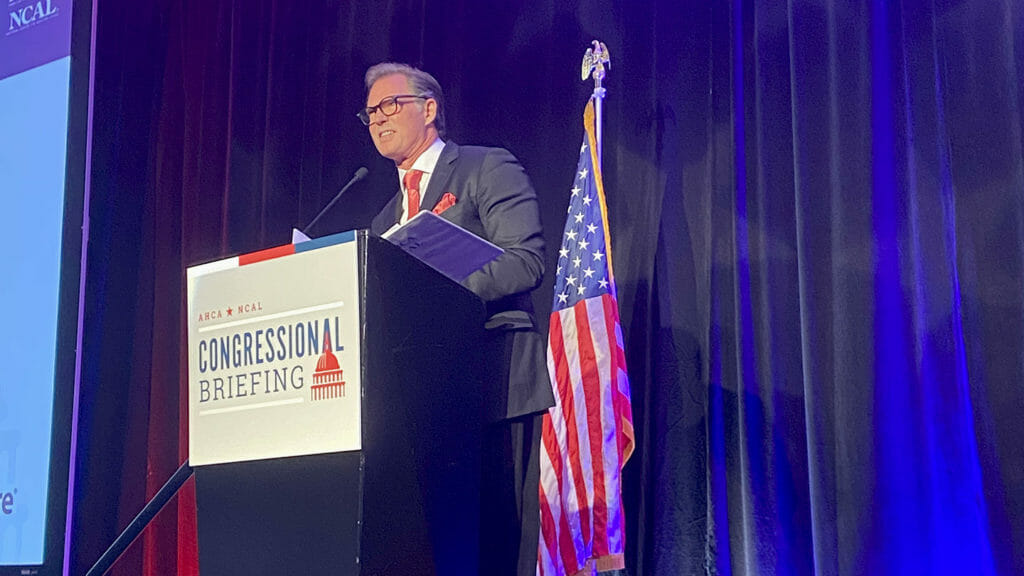
WASHINGTON, DC — After two years in which nursing homes have been pilloried in the media and come under increased regulatory scrutiny, the nation’s top provider organization hopes two days of in-person meetings with federal lawmakers will usher in a course correction.
More than 500 operators and industry leaders plan to visit lawmakers on Capitol Hill this week, seeking their help with funding in the face of a threatened mammoth Medicare cut. Ongoing labor and occupancy challenges, the looming expiration of a training waiver for temporary nurse aides, and other regulatory challenges also will be addressed.
The event is the first in-person fly-in for members of the American Health Care Association / National Center for Assisted Living since before the pandemic. And it might be its most important ever, leaders have said.
“The White House, CMS and Congress have a choice: They can do nothing and make our recovery tough or they can take action and be part of building a better recovery for LTC/PAC providers,” Phil Fogg, AHCA board chair and CEO of Marquis Companies, said during Monday’s evening’s Congressional Briefing. “Doing nothing is a lot easier than taking action, especially when addressing the complexity of our challenges and solutions.
“We all need to advocate, push and, I would say, fight to make sure that DC understands what we’ve gone through, where you are today and what you need in the future to recover,” he added. “We cannot let doing nothing be an option.”
AHCA members had scheduled meetings with “every single Congressional office,” said President and CEO Mark Parksinson, making them one of the most engaged interest groups in DC this year. The urgency is real for providers, who according to a new survey, have seen their costs increase 41% over the last year.
“It matters. The fact that you are here and that you will be up on the Hill improves our chances of getting our payment reduction phased in,” Parkinson said. “It improves our chances of extending the TNA program. It improves our chance to keep federal regulation out of assisted living.”
Fogg and Clif Porter, senior vice president of government affairs for AHCA, both told McKnight’s Long-Term Care News a key push this year is making sure the messages being delivered to Congress also reach key decision-makers at the Centers for Medicare & Medicaid Services, which is driving much of the sector’s regulatory and payment concerns.
Ahead of their official Capitol Hill trips, members Monday heard from Sen. Joe Manchin (D-WV) on his rationale for voting against and effectively killing Build Back Better, a legislative package that he said would have cost the U.S. $6 trillion over a decade. Some providers had backed the bill for the significant support it would have poured into home- and community-based services, but Manchin was warmly welcomed by the AHCA rank-and-file Monday.
Manchin said he would like to see more support for rural and nursing home provider organizations, citing a $16,000 per resident increased cost of care for COVID patients in West Virginia.
“You got the smallest proportion of all the funding that went out the door,” Manchin said. “Something’s wrong. It didn’t equate into the healthcare that we were depending on if you had my mother, my uncle or my aunts or any of my family.”
Manchin said he understood the need for ongoing support for the sector, noting the continuing pandemic and “one heck of a tight labor pool.”
Survey shows staff pressures building
The comments came on the same day AHCA released results of a new survey showing one-third of providers say their staffing woes have gotten “much worse” since January. Eighty-seven percent of respondents reported moderate or high staffing shortages.
AHCA also found that 99% are asking staff to work overtime; 71% have hired agency staff and 61% have limited admissions at some point. Those facts were borne out by Tina Sandri, AHCA board member and CEO of the 132-year-old Forest Hills of DC. She told McKnight’s Monday that she was down more than 20 of about 200 staff members and is able to keep the doors fully open only due to overtime and careful scheduling.
But even against that backdrop, Manchin insisted the idea of additional provider relief funding was “dead as a doornail.” Asked by Porter about rumors of a slimmed-down package, Manchin offered a resounding “no.”
Manchin said he was more interested in addressing the staffing shortage through longer-term solutions, such as forgiveness of federal student loans for workers who commit to working in skilled nursing or other high-demand allied service positions.
Meanwhile, Congress is still trying to hammer out a final agreement on another $10 billion in COVID funding that could support efforts such as ongoing testing, vaccinations and treatment development. Whether that gets resolved before election season remains anyone’s guess, several observers said.
Inflation was also a hot topic during the session, the first of two Congressional Briefings during the “fly-in” meeting. AHCA recently reported the cost of nursing-related goods has risen 8.5%, and the survey released Monday showed operators reporting overall cost increases of 41% over this time last year.
Inflation is likely to hurt the ruling political party, meaning Democrats who have backed major reform in the last year, added keynote speaker Major Garrett of CBS News.
The urgency developing as members of Congress head toward election season could be helpful, too, acknowledged lobbyists who spoke in an earlier session. Federal lawmakers up for reelection are eager to make something happen before the session ends so they can tell their constituents what they delivered on. Propping up healthcare providers could be a win.
“Right now is the time to be here,” said Dan Farmer, principal at lobbying firm BJR Group. “You have a window.”




